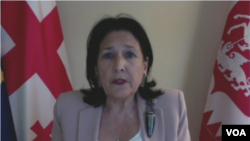Georgia’s parliament this week passed a so-called “foreign influence” bill. The government says the bill is needed to prevent foreign interference in its politics, but critics call it a Russian-style threat to stifle free speech.
The ruling Georgian Dream party approved the legislation despite warnings from Washington and Brussels that doing so might threaten Georgia’s partnership with the West.
In an interview with VOA, Georgian President Salome Zourabichvili, a political independent previously supported by the Georgian Dream party, characterized the law as a clear reversal of Georgia’s “Western path” that will jeopardize its bid to join the European Union.
Zourabichvili has vowed to veto the law, despite Georgian Dream having a veto-proof majority in parliament.
The following transcript has been edited for brevity and clarity:
VOA: Today, we are going to discuss a controversial foreign agent bill that was passed by the Georgian parliament. Critics argue that it mirrors a similar law in Russia designed initially to protect national sovereignty but in practice is used to target opposition voices. Madame President, why does the potential adoption of this law pose a threat to your country?
Georgian President Salome Zourabichvili: Because we are at a very critical time in our traveling toward the European Union. We just got last December, the status of candidate to the European Union. That was not absolutely clear that we were going to get it, but we got it, and the population was absolutely enthusiastic about this result.
And then we see that we have the possibility by the end of the year or beginning of next year to get the next step, which is the opening of the negotiations of accession. And so it's an extremely important time. And at this very important time, we have a number of recommendations that have been presented by the European Commission that we should be working upon to get the maximum chances to open negotiations.
And instead of doing that, we see that the authorities are taking another road, which is not adopting the different reforms that we are asked to adopt, especially in the field of justice reform or anti-corruption. And on the contrary, they are representing a law that was presented last year, was said to be not conformed to European values, was criticized by the civil society, was rejected by also mass demonstrations and was taken back by the authorities with a promise to its own population that it was not going to be ever discussed or represented.
And as it happens, this was a lie, and it is represented at the worst time, because we should be working on the positive legislation that is expected from us. And we have not very many months, because by the end of June, we should have accomplished some of the steps, because the conclusion, the recommendations of the EU Commission are expected by September, October.
So time is [passing] and we're losing this time to replicate some Russian laws that the public here knows very well how it was used in Russia. It was used to limit the capacity of the civil society, to act as a civil society, to defend human rights, to defend political rights. And it was also used against the free media....
And another thing is that it's parallel with rhetoric that was restarted, I would say, two months ago, that is very critical, very anti-Western, anti-American, anti-European, accusing our partners, those that have helped Georgia to really become independent, [to] have state institutions, they're accused of … wanting to foment destabilization [in Georgia], wanting to overthrow the government.
So all of that is creating an atmosphere. And that is what the population is reacting to. It's everything together. It's not just the law … it's not one law. It's a number of laws … I've said that I would veto every law that goes against spirit and the letter of the recommendations of the European Commission.
VOA: Madam President, just to clarify, can you and will you veto this legislation?
Zourabichvili: Yes, I can veto and I'm telling you that I vetoed the six laws for the same reasons, that they were anti-European values and not going in the right direction. And I announced that, and I will do the same with this one, which is clearly not in line, as I've said [to] all our partners very clearly, loud and clear, that this does not conform to European values and recommendations.
So I will veto it. And it will be a veto that will be [overridden], because the majority is in the hands of the ruling [Georgian Dream] party. But this veto is a representation of the voice of the population that is on the streets. It is symbolic as much as this opposition is symbolic.
And from then on, we have to move to the only way out and way back, I would say, to our European integration path, which are elections, elections in which a new majority has to come in … that will abolish the laws that are going against the European integration.
VOA: Madam President, White House press secretary Karine Jean-Pierre recently expressed deep concern over this legislation, stating that its passage would necessitate a fundamental reassessment of U.S. relations with Georgia. What's your reaction to that statement?
Zourabichvili: Well, my reaction is the same. I had the visit yesterday. We had the visit of Mr. O'Brien [Assistant U.S. Secretary of State for European and Eurasian Affairs James O'Brien] also representing the State Department, who came specifically to Georgia to see what was happening and tell us what was the position of the United States.
We had today many visits of our European partners, ministers of different Scandinavian countries, and there are other visits that are [impending]. So it's very clear that the position of our partners is well-known, is the same, that this law does not conform to European values. ...
Now my position is that any reaction of our partners, whether American or Europeans, reacting to this law and to other laws in terms of opposing our [EU] candidate status or imposing some sanctions on visas, for instance, [on Georgians], it's something that should wait for what is a democratic moment, which are elections. Elections will determine what the population wants. …
If the Georgian population, which I don't think will happen, decides that it doesn't want to continue on that European path, then yes, clearly reactions [are] to be expected from our partners. Individual sanctions are something I do not comment upon … that is up to the individual nations or organizations to decide. ...
But today … the vast majority of the pro-European Georgians need the support of our international partners. …
What everybody has to understand today is that for the Georgian population, for everyone here today, Georgian independence is equated to the European path and to Western integration, to Euro-Atlantic integration. We know that if we lose that support and that community, we remain isolated in front of Russia. And that means … independence will be at stake.
That's why there is such a strong support for the European path. Maybe not everyone understands the intricacies of what the European Union is about, about the process of accession, but everyone understands that our freedom, our independence and our future is linked to Europe.
VOA: There is a growing discussion about potential modifications to this law to mitigate its damaging effects. Can the Georgian Dream party be trusted in this process?
Zourabichvili: For me and for the vast majority of the people that are demonstrating on the streets, no. You do not trust somebody that has presented a law, then rejected it, then promised that it will not happen again, and then reintroduced it without any logical need, any political need. … So it's just a confrontation with one's own population for no good reason. It's just pushing towards more polarization for no good reason. And I don't think that what is intrinsically bad can be amended.











